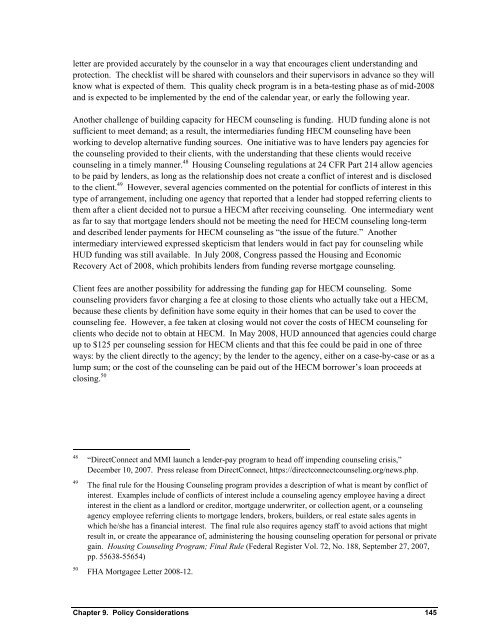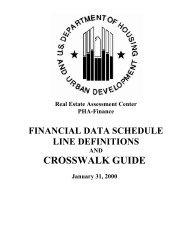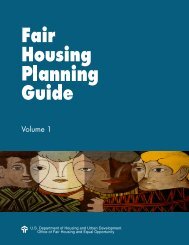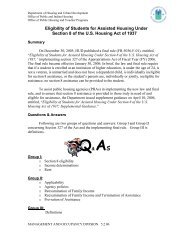Housing Counseling Process Evaluation and Design of ... - HUD User
Housing Counseling Process Evaluation and Design of ... - HUD User
Housing Counseling Process Evaluation and Design of ... - HUD User
You also want an ePaper? Increase the reach of your titles
YUMPU automatically turns print PDFs into web optimized ePapers that Google loves.
letter are provided accurately by the counselor in a way that encourages client underst<strong>and</strong>ing <strong>and</strong><br />
protection. The checklist will be shared with counselors <strong>and</strong> their supervisors in advance so they will<br />
know what is expected <strong>of</strong> them. This quality check program is in a beta-testing phase as <strong>of</strong> mid-2008<br />
<strong>and</strong> is expected to be implemented by the end <strong>of</strong> the calendar year, or early the following year.<br />
Another challenge <strong>of</strong> building capacity for HECM counseling is funding. <strong>HUD</strong> funding alone is not<br />
sufficient to meet dem<strong>and</strong>; as a result, the intermediaries funding HECM counseling have been<br />
working to develop alternative funding sources. One initiative was to have lenders pay agencies for<br />
the counseling provided to their clients, with the underst<strong>and</strong>ing that these clients would receive<br />
counseling in a timely manner. 48 <strong>Housing</strong> <strong>Counseling</strong> regulations at 24 CFR Part 214 allow agencies<br />
to be paid by lenders, as long as the relationship does not create a conflict <strong>of</strong> interest <strong>and</strong> is disclosed<br />
to the client. 49 However, several agencies commented on the potential for conflicts <strong>of</strong> interest in this<br />
type <strong>of</strong> arrangement, including one agency that reported that a lender had stopped referring clients to<br />
them after a client decided not to pursue a HECM after receiving counseling. One intermediary went<br />
as far to say that mortgage lenders should not be meeting the need for HECM counseling long-term<br />
<strong>and</strong> described lender payments for HECM counseling as “the issue <strong>of</strong> the future.” Another<br />
intermediary interviewed expressed skepticism that lenders would in fact pay for counseling while<br />
<strong>HUD</strong> funding was still available. In July 2008, Congress passed the <strong>Housing</strong> <strong>and</strong> Economic<br />
Recovery Act <strong>of</strong> 2008, which prohibits lenders from funding reverse mortgage counseling.<br />
Client fees are another possibility for addressing the funding gap for HECM counseling. Some<br />
counseling providers favor charging a fee at closing to those clients who actually take out a HECM,<br />
because these clients by definition have some equity in their homes that can be used to cover the<br />
counseling fee. However, a fee taken at closing would not cover the costs <strong>of</strong> HECM counseling for<br />
clients who decide not to obtain at HECM. In May 2008, <strong>HUD</strong> announced that agencies could charge<br />
up to $125 per counseling session for HECM clients <strong>and</strong> that this fee could be paid in one <strong>of</strong> three<br />
ways: by the client directly to the agency; by the lender to the agency, either on a case-by-case or as a<br />
lump sum; or the cost <strong>of</strong> the counseling can be paid out <strong>of</strong> the HECM borrower’s loan proceeds at<br />
closing. 50<br />
48<br />
49<br />
50<br />
“DirectConnect <strong>and</strong> MMI launch a lender-pay program to head <strong>of</strong>f impending counseling crisis,”<br />
December 10, 2007. Press release from DirectConnect, https://directconnectcounseling.org/news.php.<br />
The final rule for the <strong>Housing</strong> <strong>Counseling</strong> program provides a description <strong>of</strong> what is meant by conflict <strong>of</strong><br />
interest. Examples include <strong>of</strong> conflicts <strong>of</strong> interest include a counseling agency employee having a direct<br />
interest in the client as a l<strong>and</strong>lord or creditor, mortgage underwriter, or collection agent, or a counseling<br />
agency employee referring clients to mortgage lenders, brokers, builders, or real estate sales agents in<br />
which he/she has a financial interest. The final rule also requires agency staff to avoid actions that might<br />
result in, or create the appearance <strong>of</strong>, administering the housing counseling operation for personal or private<br />
gain. <strong>Housing</strong> <strong>Counseling</strong> Program; Final Rule (Federal Register Vol. 72, No. 188, September 27, 2007,<br />
pp. 55638-55654)<br />
FHA Mortgagee Letter 2008-12.<br />
Chapter 9. Policy Considerations 145
















